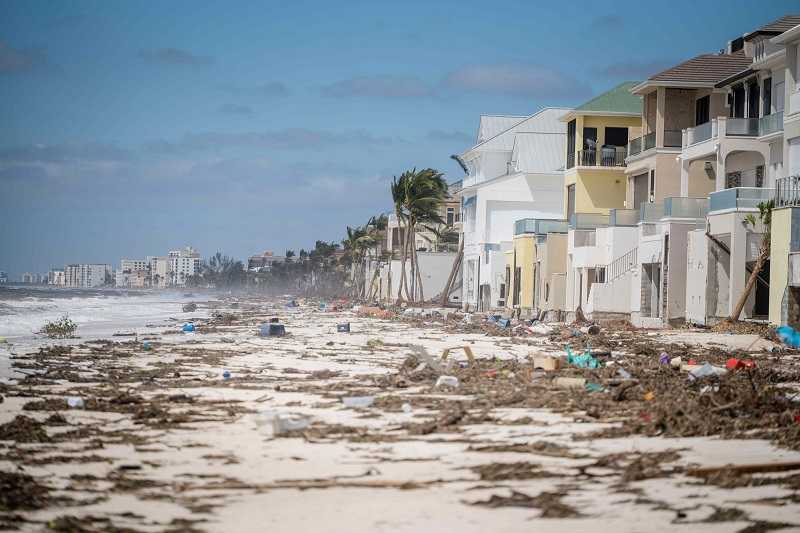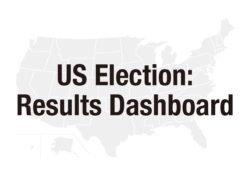Florida’s insurance woes could make Ian’s economic wrath even worse

Hurricane damage on Sept. 29 in Fort Myers Beach, Fla.
14:18 JST, October 1, 2022
ORLANDO – The economic devastation left behind by Hurricane Ian in Florida is likely to put further pressure on the state’s fragile insurance system.
About a dozen firms that provide homeowners insurance in Florida have become insolvent in the past two years, according to the Florida Office of Insurance Regulation, leaving hundreds of thousands of property owners scrambling for coverage. Many Florida homeowners in flood-prone areas don’t carry flood insurance, the Federal Emergency Management Agency has said – despite the fact that many policies don’t cover flood damage.
And as insurers assess the impact of the storm and assess future risk as extreme weather events grow more common, coverage could get pushed even more out of reach for Floridians.
“Obviously this is going to be a multibillion-dollar storm, and with the insurance industry already crumbling, this is going to be devastating,” said state Sen. Jeff Brandes, a Republican.
A Fitch Ratings analysis Thursday estimated insured cost losses could be from $25 billion to $40 billion in the state. Brandes estimated that only around 20 percent of residents in the areas under evacuation orders have federal flood insurance and many others don’t have adequate property insurance given the scale of the destruction.
A unique confluence of factors makes Florida an exceptionally difficult place for private insurers to do business, and for homeowners to find affordable comprehensive plans from private companies. As Ian has shown, the state is susceptible to dangerous weather events, something that’s likely to increase over time because of climate change. Insurance companies’ risk models, which incorporate thousands of years of weather data, have proved unreliable when it comes to the most recent storms, said Danielle Lombardo, chair of the Global Real Estate Practice at Lockton, an independent insurance brokerage and consultancy.
“It is the most risky piece of land in the world for insurers from a catastrophe standpoint,” Lombardo said.
Lawmakers and industry officials said Ian could doom private homeowner insurers unless the state legislature steps in, while consumer advocates said residents faced getting completely priced out of the market.
More than 400,000 Florida consumers have lost coverage already this year due to failed insurers or policy increases, according to Mark Friedlander, corporate communications director for the Insurance Information Institute, a research and communications nonprofit for the industry.
Already, some consumers “are now in a position where they are having to attempt to try to locate new coverage, and they just simply aren’t able to find any insurance company that is willing to write them,” said Tasha Carter, Florida’s insurance consumer advocate.
Florida’s laws regarding insurance litigation tend to favor plaintiffs, according to industry officials and independent experts, so that insurance companies are constantly dealing with a barrage of lawsuits. According to the state’s Office of Insurance Regulation, Florida accounted for 76 percent of all homeowners lawsuits nationwide in 2021.
Meanwhile the state’s population has continued to grow, creating more demand, even as risk-averse insurers are trying to exit the marketplace, leading to less supply. All of this combines for higher rates for consumers.
Gov. Ron DeSantis (R) called a special session in May to address the property insurance crisis, but many say the law he signed does nothing to help consumers now. And some of the elements of the law, such as My Safe Florida Home, which is supposed to offer grants to homeowners who retrofit their homes to add hurricane protection, still aren’t up and running four months later.
In an interview on the Weather Channel this week, DeSantis said the goal was to avoid disputes over damages and make people whole as quickly as possible.
“The goal is to get these claims as quickly as possible. So it’s basically leveraging government to get everybody in line, and let’s get people back on their feet,” DeSantis said.
Florida residents do have recourse to a state-created nonprofit often referred to as the “insurer of last resort” – Citizens Property Insurance Corporation of Florida. Citizens will insure people who can’t find private insurance, and their rates are capped at 10 percent annually – which has kept them lower than some private insurers that have raised rates astronomically.
Citizens has seen exponential growth in demand over the last couple of years, with 1.1 million policyholders, double where it was two years ago, spokesman Michael Peltier said. But there’s a catch: The legislature required Citizens to operate without state funding, so when a big disaster hits and claims pour in, it assesses fees up to 45 percent on its policyholders.
“The true cost of a Citizens policy can increase dramatically following a major disaster,” the company itself notes in its literature.
Citizens is facing approximately 20,000 lawsuits, Peltier said.
"News Services" POPULAR ARTICLE
JN ACCESS RANKING







